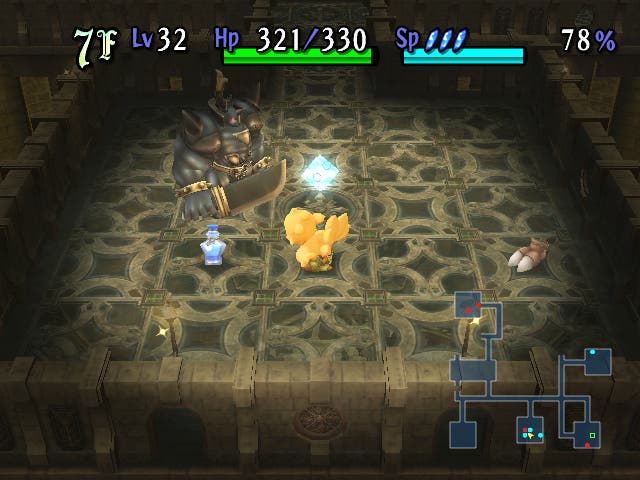Final Fantasy Fables: Chocobo's Dungeon
Chick-like.
The game takes few liberties with the genre. Though you might not realise it at first, play is turn-based in that enemies only act when you do, be it by moving around the environment or issuing a spell or attack. Stand still and everything else on the dungeon floor will stay put, reanimating the moment you do something. As such, movement requires some tactical consideration, encouraging the player to find the most effective routes, luring enemies into tight corridors where they can be attacked one by one rather than en masse. The strategy isn't deep but it is interesting and, as all of the game's calculations and turns take place in an instant, the game hides its antiquated rule set well.
Chocobo's heath must be carefully managed using potions found on the dungeon floor. Further low-level pressure is exerted by his hunger gauge, which must be continually kept topped up with gyshall greens. If this empties then Chocobo begins to starve, draining his health with each pang of hunger. Lose all of your health points and you'll be kicked back to town, losing any unequipped items and money you'd accrued during the excursion.
Luck plays a key role in the game, a design decision that will likely put off methodical western players. Not only is the placement of potions and food randomly decided but also the locations of hidden traps that litter the dungeon's corridors and chambers. These can be foiled by swiping at adjacent spaces but no player will have the time or patience to do this before taking every single step. Traps, particularly later in the game, can be deadly, pummelling Chocobo with rocks, fire and even summon-monsters who can wipe an hour's progress in an instant. The random game design means that sometimes it appears far too easy (like when you reach a new floor only to find the next set of stairs are right next to you) but sometimes far too punishing. As such it's best approached with an understanding that sometimes the odds will work your way and sometimes they most definitely won't.

Food and potions aren't only items that litter these floors. In addition you'll be able to pick up new armour and weapons, which can be upgraded at the blacksmith's in town to increase your attack and defense power. The designers' generous decision to let you hang on to equipped items when you die is a welcome one and as such weapons and armour are to be treasured as the game's most valuable commodity. Final Fantasy's well-established job system also features, imported to make the game further stand out. The opportunity to cast your Chocobo as a White Mage, Dark Knight, Scholar or Dancer makes him a super-versatile entity and setting the class to match the dungeon's theme becomes second nature.
Many Roguelikes made today are created on a shoestring budget by niche Japanese developers with few resources. By contrast Chocobo's Dungeon has the full weight and financial support of one of Japan's largest publishers and the quality of the execution this affords is obvious. Chocobo's animation is exemplary, his control responsive and satisfying. Graphically the game doesn't push the Wii, but the visuals are competent and don't overreach themselves.
Roguelikes are something of an anachronism in these times of forgiving, everyone-must-succeed game design. But the relative success of handheld titles such as Shiren the Wanderer and Izuna: the Unemployed Ninja demonstrates that, when handled well, this crotchety genre can still attract a dedicated following. Chocobo's Dungeon succeeds where the recent Pokémon Mystery Dungeon fails, by delivering a licensed dungeon crawler that is a credit to its franchise as well as its tradition.

